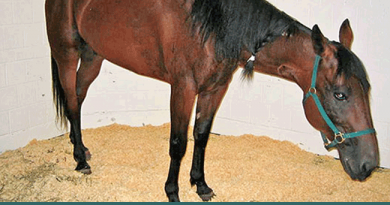SAVI (String-Associated Vasculopathy Infancy Dependent)
Abstract
String-associated vasculopathy infancy is a rare autoinflammatory vasculopathy characterized by lesions in the skin and interstitial lung disease. It was first discovered in 2014. It is a genetic disorder. Mutation in the STING 1 gene is responsible for SAVI. Let’s discuss it in detail!

Introduction
String-associated vasculopathy infancy is an autosomal dominant disease. It begins in infancy. It is characterised by vasculopathy and interstitial lung disease. This disease is a result of a Mutation in the STING 1 gene. Due to vasculopathy, there is damage to the tissues that depend on these vessels for blood supply. Affected individuals have experienced the Raynaud phenomenon, in which the affected area changes colour from white to blue and then red on exposure to cold and stress. It can further require amputation. The prognosis of SAVI is poor, especially with severe lung disease involvement. It has a high mortality rate.
Causes
Genetic mutations
Mutations in the STING 1 gene leads to the overproduction of inflammatory proteins causing excessive inflammation and tissue damage.
STING 1 gene is responsible for the production of STING protein. STING protein is responsible for the production of beta-interferon (Cytokines) that promotes inflammation.
Symptoms
- Low-grade fever
- Coughing
- Skin lesions: Skin lesions begin as rashes and can convert into ulcers. Skin lesions are seen in fingers, toes, nose, cheeks, and ears.
- Pulmonary lesions
- Lung fibrosis
- Dyspnea (Difficulty in breathing)
- Failure to thrive
- Swollen lymph nodes
- Joint stiffness
- Myositis (Muscle inflammation)
Diagnosis
- Blood culture
- Imaging: X-rays, CT scans, and MRI to check lung disease.
Genetic testing: It is done in order to check mutation in STING 1 gene (TMEM 173)
Ayurvedic Overview
According to Ayurveda, SAVI is a medical condition as a result of Bija Dushti (Abnormal sperm and ovum). SAVI is a genetic disorder categorised under Sahaja Roga (Hereditary disease) or Kulaj rogas. Abnormality in sperm and ovum, unfavourable conditions inside the uterus, and marriage in identical gotras cause genetic disorders. This bija dushti affects doshas (Vata, Pitta and Kapha) and symptoms are seen in the form of skin lesions, dyspnea, pulmonary lesions, growth retardation and joint stiffness in SAVI.
Treatment
According to Ayurveda, SAVI is managed by balancing doshas (Vata, Pitta, and Kapha), taking a diet that promotes the growth of a child (high protein diet), and lifestyle changes
The following herbs can be given in SAVI
- Shallaki
- Guduchi
- Haridra
- Ashwagandha
- Yashtimadhu
Herbal Remedies for SAVI by Planet Ayurveda
Planet Ayurveda provides the best combination of effective herbal remedies for the management of String-associated vasculopathy infancy. For natural and herbal treatment always look for natural products which contain pure extracts and are formulated under GMP guidelines. Planet Ayurveda products are scientific and certified. They are free from any chemicals, additives, and preservatives. Planet Ayurveda products are formulated by MD Doctors and are 100% natural, pure, and free from side effects. Planet Ayurveda offers the following herbal remedies for the management of String-associated vasculopathy infancy.
Product List
- Boswellia Curcumin
- Arvindasav
- Syrup Infee
- Cap. Manjishtha
Product Description
1. Boswellia curcumin
Boswellia curcumin is an ayurvedic formulation that contains extracts of Shallaki (Boswellia serrata) and Haridra (Curcuma longa) that is curcumin. Both Boswellia and Curcumin have anti-inflammatory and analgesic properties. This extract helps in pacifying Vata dosha. Shalaki provides relief from joint pain, skin conditions and ulcers associated with SAVI. Curcumin is responsible for reducing inflammation in blood vessels and lungs.
Dosage: 1 capsule twice daily, after meals with plain water
2. Arvindasav
Arvindasav is a herbal formulation that contains Kamal phool (Nelumbium speciosum), Khus (Vetiveria zizanioides), Gambhari (Gmelina arborea), Nelophar (Nymphaea stellata), Majith (Rubia cordifolia), Dhay phool (Woodfordia fruticosa) and various other herbs. This liquid mix of herbs is specially prepared for infants and children. It promotes proper growth in children. It improves digestion and the assimilation of food. It is also helpful in managing respiratory illnesses.
Dosage: 2 tablespoons with an equal quantity of water once or twice after meals.
3. Syrup Infee
Syrup Infee is a wonderful formulation that contains extracts from Yashtimadhu (Glycyrrhiza glabra) and Guduchi (Tinospora cordifolia). Yashtimadhu pacifies Vata and Pitta whereas Guduchi balances all three doshas. Yashtimadhu is used in treating skin-related problems associated with SAVI. Yashtimadhu and guduchi are useful in degenerative diseases and improve immunity. Guduchi is an immunomodulator and helps in managing SAVI.
Dosage: For infants: 5-10 drops twice a day with water.
For children: ½ to 1 teaspoon a day with water.
4. Cap. Manjishtha
It is a herbal formulation that contains Manjishtha (Rubia cordifolia). Manjistha is known for its Pitta shamak (Pacifies Pitta) properties. It balances both Pitta and Kapha. It is exclusively used for skin problems. It helps in subsiding skin lesions (rashes, ulcers) seen in SAVI.
Dosage: 1 capsule twice daily with plain water after meals.
Contact Planet Ayurveda Support Team to provide you the costing / ordering and delivery information at – costing.planetayurveda@gmail.com or Call at 0172-521-4030 (India), +91-172-521-4030 (Outside India) or Whatsapp at (+91) 9915-593-604
Conclusion
SAVI is an autosomal dominant disease that is caused due to genetic mutations. According to Ayurveda, it is due to Bija Dushti (Chromosomal abnormality). Ayurvedic management of SAVI includes balancing Dosha, Dhatus and Malas through the use of herbal formulations.





